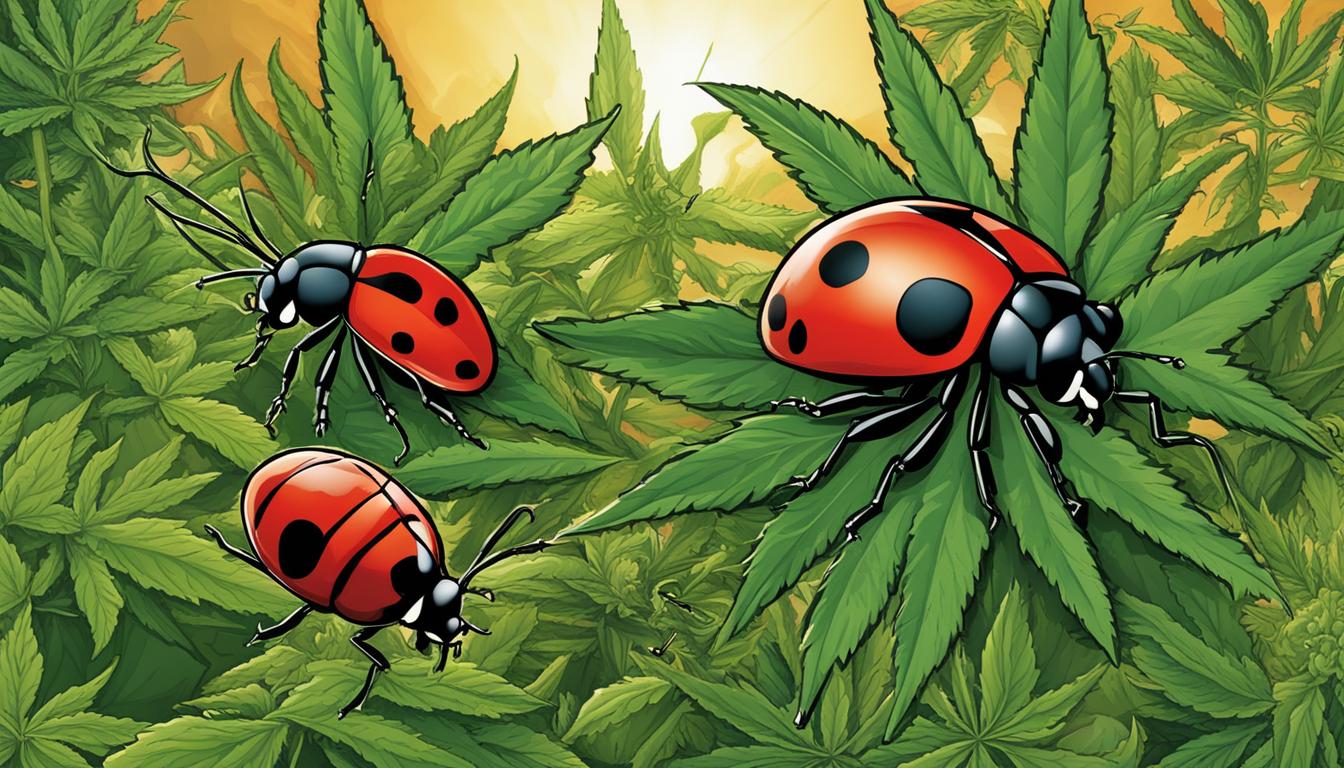As a cannabis cultivator, you understand the importance of healthy plants for a successful harvest. Organic methods are not only sustainable and eco-friendly but also promote the natural balance of your growing environment. By implementing these methods, you can boost your yield naturally without the use of harmful chemicals.
In this comprehensive guide, we will explore the top organic methods for ensuring the health and vitality of your cannabis plants. From understanding organic gardening tips to implementing sustainable practices and chemical-free methods, we will cover everything you need to know to keep your cannabis plants thriving.
Key Takeaways:
- Organic methods promote sustainable and eco-friendly cultivation
- Healthy cannabis plants lead to a successful harvest
- Understanding organic gardening tips can help improve overall plant health
- Implementing sustainable practices can promote plant health and sustainability
- Chemical-free methods can provide a natural balance in your growing environment
Understanding Organic Gardening Tips for Cannabis
Organic gardening is all about working in harmony with nature to promote the health and vitality of your cannabis plants. By taking a natural approach, you can avoid the use of harmful chemicals and promote a more sustainable and environmentally friendly growing environment. Here are some organic gardening tips for cannabis:
- Start with high-quality soil: Your cannabis plants need nutrient-rich soil to thrive. Instead of relying on synthetic fertilizers, opt for organic soil amendments like compost and worm castings.
- Use organic pest control: Pests can quickly become a problem in any garden. Instead of reaching for chemical pesticides, try natural solutions like introducing beneficial insects or using homemade sprays made from essential oils.
- Choose natural sources for nutrients: Organic fertilizers like bone meal, fish emulsion, and kelp meal provide your cannabis plants with the essential nutrients they need without introducing harmful chemicals to your growing environment.
- Practice water conservation: Conserving water is not only good for the environment, but it can also help save you money on your water bill. Use drip irrigation or soaker hoses to deliver water directly to the roots of your plants, and mulch around them to help retain moisture.
- Rotate your crops: To prevent the buildup of pests and diseases in your garden, rotate your crops each season. This can also help replenish the nutrients in your soil and improve overall plant health.
By incorporating these natural ways to care for your cannabis plants, you can promote their overall health and resilience while maintaining an eco-friendly approach to cultivation. Next, we’ll explore sustainable practices you can implement for cannabis cultivation in Section 3.

Implementing Sustainable Practices for Cannabis Cultivation
As a responsible cannabis cultivator, you understand the importance of implementing sustainable practices to promote the health and longevity of your plants. By taking a holistic approach to cannabis plant health, you can minimize your environmental impact while ensuring a bountiful harvest. Here are a few sustainable practices that can help:
Soil Management Techniques
The health of your cannabis plants starts with the soil they are grown in. Implementing soil management techniques, such as composting and cover cropping, can help improve soil fertility and structure. Composting organic matter, such as kitchen scraps, grass clippings, and leaves, can provide your plants with essential nutrients and microorganisms. Cover cropping with legumes can fix nitrogen in the soil, reducing your need for synthetic fertilizers.
Water Conservation Strategies
Water is a precious resource, and as a cannabis cultivator, it’s important to use it responsibly. Implementing water conservation strategies like drip irrigation and rainwater harvesting can help reduce water waste and minimize your impact on local water resources. Consider using drought-tolerant cannabis strains, which require less water to thrive.
Integrated Pest Management
Integrated pest management is a sustainable approach to pest control that focuses on prevention rather than eradication. By implementing practices like crop rotation, companion planting, and natural pest predators, you can reduce the need for synthetic pesticides and herbicides. Additionally, using organic pest control methods such as neem oil and insecticidal soap can help manage pests without harming beneficial insects or pollinators.
| Sustainable Practices for Cannabis Cultivation | Benefits |
|---|---|
| Composting | Provides essential nutrients and microorganisms to the soil |
| Cover Cropping | Fixes nitrogen in the soil |
| Drip Irrigation | Reduces water waste |
| Rainwater Harvesting | Minimizes impact on local water resources |
| Integrated Pest Management | Focuses on prevention rather than eradication, reducing the need for synthetic pesticides |
| Organic Pest Control Methods | Manages pests without harming beneficial insects or pollinators |
By implementing sustainable practices for cannabis cultivation, you can promote the health and well-being of your plants while minimizing your environmental footprint. These holistic approaches to cannabis plant health not only benefit your plants but also contribute to a more sustainable future for all.

Opting for Chemical-Free Methods for Healthy Cannabis Plants
Chemical-free methods for maintaining healthy cannabis plants can provide a more eco-friendly and sustainable approach to cultivation. Eliminating the use of synthetic fertilizers and pesticides can promote a healthier growing environment for both your cannabis plants and the surrounding ecosystem.
By avoiding the use of harmful chemicals, you can also ensure that your cannabis is safer and healthier for consumption. Chemical residues can linger in cannabis flowers and negatively impact the health of those who consume them.
Organic Fertilizers
One way to promote healthy cannabis plants using chemical-free methods is by implementing organic fertilizers. Unlike synthetic fertilizers, which can cause nutrient imbalances and damage to soil health over time, organic fertilizers provide a balanced and sustainable source of nutrients for your plants.
Some popular organic fertilizers for cannabis cultivation include:
| Fertilizer Type | Description |
|---|---|
| Blood meal | A high-nitrogen fertilizer made from dried animal blood. Ideal for promoting vegetative growth. |
| Bone meal | A slow-release fertilizer made from ground animal bones. Ideal for promoting root growth. |
| Fish emulsion | A liquid fertilizer made from fish waste. Provides a balanced source of nutrients. |
Using compost is another excellent way to nourish your cannabis plants with organic nutrients. Composting kitchen scraps, yard waste, and other organic matter can create a rich and nutritious soil amendment that can benefit your cannabis plants.
Organic Pest Control
Managing pests without the use of chemical pesticides can be challenging but is feasible with organic pest control methods. By using natural predator insects, such as ladybugs and praying mantises, you can manage common cannabis pests, including spider mites and aphids.
Application of homemade sprays, using ingredients such as neem oil and garlic, can also be effective in deterring pests. These substances are less harmful to beneficial insects, like bees and butterflies, compared to synthetic pesticides.
Soil Management Techniques
Implementing sustainable soil management techniques can help maintain a healthy and productive growing environment for your cannabis plants. Techniques such as crop rotation, cover cropping, and mulching can help promote healthy soil structure and prevent nutrient depletion.
Crop rotation involves planting different crops in a particular area each season to prevent soil-borne diseases and nutrient depletion. Cover cropping involves planting specific crops, such as legumes or grasses, to improve soil fertility and structure. Mulching involves covering the soil around your cannabis plants with organic material, such as leaves or straw, to retain moisture and suppress weed growth.
Overall, implementing chemical-free methods for cultivating healthy cannabis plants can benefit both your plants and the surrounding environment. By nourishing your plants with organic nutrients, managing pests naturally, and maintaining sustainable soil practices, you can produce high-quality cannabis while minimizing the use of harmful chemicals.
Nourishing Cannabis Plants with Organic Nutrients
Organic nutrients are essential to the health and vitality of your cannabis plants. By providing your plants with natural sources of nutrients, you can promote robust growth and improve the quality of your yield. Here are some organic methods to nourish your cannabis plants:
- Composting: Create your own nutrient-rich soil amendment by composting kitchen scraps, yard waste, and other organic materials. Compost provides a balanced blend of nutrients, including nitrogen, phosphorus, and potassium, which are essential for healthy plant growth. Use compost as a soil additive or top dressing around your plants.
- Organic fertilizers: Choose fertilizers made from natural sources, such as bone meal, blood meal, and fish emulsion. These organic fertilizers release nutrients slowly over time, providing a steady supply of essential elements to your cannabis plants.
- Cover crops: Sow cover crops such as clover, ryegrass, or legumes to enrich the soil with nitrogen. These plants fix nitrogen in the soil, making it available for your cannabis plants to use.
It’s crucial to ensure that you provide your cannabis plants with the right amount of nutrients. Too much or too little can lead to nutrient deficiencies or toxic build-up, which can harm your plants. Keep in mind that cannabis plants have different nutrient requirements during different growth stages, so adjust your nutrient schedule accordingly.
Here is an example of a general nutrient schedule for cannabis plants:
| Growth Stage | Nutrients | N-P-K Ratio |
|---|---|---|
| Vegetative | Nitrogen, Phosphorus, Potassium | 3-1-2 |
| Flowering | Nitrogen, Phosphorus, Potassium, Calcium, Magnesium, Sulfur | 1-3-4 |
Remember to monitor your plants for any signs of nutrient deficiencies or excesses, such as yellowing leaves or burnt tips. Adjust your nutrient schedule accordingly and maintain a healthy balance of essential elements for optimal plant growth.
Implementing Organic Pest Control for Cannabis Plants
You’ve put in the hard work to grow healthy cannabis plants, but now it’s time to protect them from pests. Rather than relying on synthetic pesticides, which can harm both your plants and the environment, implement organic pest control methods that are just as effective.
Beneficial Insects
One of the most natural and effective ways to control pests in your cannabis garden is by introducing beneficial insects. These insects prey on common cannabis pests like spider mites, aphids, and whiteflies, while leaving your plants unharmed. Some beneficial insects to consider include:
| Insect | Pest Controlled |
|---|---|
| Ladybugs | Aphids, spider mites |
| Predatory Mites | Spider mites |
| Nematodes | Root aphids, fungus gnats |
Homemade Sprays
If you’re looking for a quick and easy solution, consider making your own organic pest control spray. These sprays are made from natural ingredients like garlic, neem oil, and hot peppers, which repel pests without harming your plants. Here’s a simple recipe to get you started:
- 1 quart of water
- 1 teaspoon of dish soap
- 1 tablespoon of baking soda
- 1 tablespoon of vegetable oil
Mix all ingredients together in a spray bottle and apply to your plants, focusing on the undersides of leaves where pests tend to hide.
Cultural Practices
Implementing cultural practices that discourage pest infestations can also help keep your cannabis garden healthy. Some practices to consider include:
- Keeping your garden clean and free of debris
- Rotating your crops to avoid pest buildup
- Planting companion plants that repel pests
- Using reflective mulches to disorient flying insects
By combining these organic pest control methods, you can keep your cannabis garden healthy and thriving without the use of harmful chemicals.
Conclusion
By implementing organic methods for your cannabis cultivation, you can ensure the health and vitality of your plants while also contributing to a more sustainable and eco-friendly approach to growing. Your cannabis plants will benefit from natural sources of nutrients, as well as eco-friendly pest control methods.
Remember to prioritize soil health and water conservation, as these factors are crucial to the overall health of your plants, and avoid using harmful chemicals and synthetic fertilizers.
Embrace these natural techniques, and watch as your cannabis plants thrive without the need for harmful pesticides or chemicals. Not only will you be doing your part in promoting sustainability and environmental friendliness, but you’ll also be enjoying a higher yield of healthy, vibrant cannabis.
FAQ
What are the top organic methods for ensuring the health of cannabis plants?
The top organic methods for ensuring the health of cannabis plants include using organic nutrients, implementing sustainable practices, opting for chemical-free methods, and practicing organic pest control.
What is organic gardening and how does it apply to cannabis cultivation?
Organic gardening is a method of cultivation that relies on natural and sustainable practices. When applied to cannabis cultivation, organic gardening involves using organic nutrients and pest control methods to promote plant health without the use of harmful chemicals.
How can I implement sustainable practices for cannabis cultivation?
To implement sustainable practices for cannabis cultivation, you can focus on soil management techniques, water conservation strategies, and overall environmental responsibility. These practices not only improve the health and sustainability of your cannabis plants but also minimize the negative impact on the environment.
What are the benefits of chemical-free methods for maintaining healthy cannabis plants?
The benefits of chemical-free methods for maintaining healthy cannabis plants include promoting a natural balance in the growing environment, minimizing the risk of chemical exposure, and contributing to a more eco-friendly approach to cannabis cultivation.
How can I nourish cannabis plants with organic nutrients?
You can nourish cannabis plants with organic nutrients by utilizing composting techniques, organic fertilizers, and natural sources of essential elements. These methods provide the necessary nutrients for healthy plant growth without relying on synthetic fertilizers.
How can I practice organic pest control for cannabis plants?
Organic pest control for cannabis plants involves using beneficial insects, homemade sprays, and other natural techniques to prevent and manage pests. By avoiding harmful chemicals, you can protect your plants and promote a healthier growing environment.
Why should I adopt organic methods for cultivating healthy cannabis plants?
Adopting organic methods for cultivating healthy cannabis plants not only improves your yield but also contributes to a more sustainable and environmentally friendly approach to cannabis cultivation. By avoiding harmful chemicals and pesticides, you can promote the natural balance of your growing environment and minimize the negative impact on the ecosystem.











